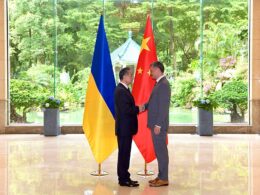Ukraine’s National Agency for the Prevention of Corruption (NAZK) has added China's three largest oil and gas firms - China National Offshore Oil Corporation (CNOOC), China Petrochemical Corporation (Sinopec), and China National Petroleum Corporation (CNPC) - to its list of international sponsors of Russia's war, the agency's press service reported.
All three companies "continue to develop joint projects with Russia and to fund Russia's strategic industry by paying substantial taxesm," the agency stated.
According to NAZK, CNOOC is China's third-largest national oil company after CNPC and Sinopec. It is China's largest offshore oil and gas producer. A CNOOC subsidiary, like fellow Chinese firm CNPC, owns 10% of the Arctic LNG 2 project located on the Gydan peninsula in Russia's Arctic region. The capital investment required to launch the project at full capacity is estimated at $21.3 billion.
Since the start of Russia's full-scale war against Ukraine, CNOOC has continued to actively expand cooperation with Russia. In July 2023, the first liquefied natural gas (LNG) gravity-based structure production train, a so-called "floating plant", of the Arctic LNG 2 project was completed and launched.
NAZK stresses that the project's implementation could increase Russia's share in the global LNG market to 15% from about 8% currently.
According to NAZK, Russian propaganda pays extraordinary attention to the project's implementation.
"Its implementation is a ‘pass’ abroad, as liquefied gas is not subject to sanctions or other secondary restrictions. Gas from Russia is a kind of insurance that unreliable overseas suppliers will not be the only ones to dictate terms to customers in the market during the winter heating season,” Russian media said.
Infrastructure facilities for liquefying natural gas show that there is no such thing as isolation of Russia from the rest of the world and technology, as Western propaganda says. The commissioning of such a plant will be a triumph that will refute all Western narratives
Sinopec is China's second largest state-owned company engaged in fossil fuel extraction and specializing in crude oil processing.
At the end of March 2022, a Sinopec representative said the Chinese state energy company would continue buying crude oil and gas from Russia even in the event of tighter Western sanctions.
Sinopec Group owns 10% of the shares of PJSC Sibur Holding. In the first half of this year, the Russian holding paid the equivalent of $347 million in taxes to the aggressor state's budget.
Through its controlled Sojitz Hong Kong Holding Limited, Sinopec also owns a 40% stake in Amur Gas Chemical Complex LLC. Last year, the company paid the equivalent of $30 million in taxes to the Russian budget.
The China National Petroleum Corporation (CNPC) is the largest Chinese national oil and gas corporation and one of the largest global energy companies in oil and gas production.
CNPC's profit in 2022 more than doubled, increasing to $21 billion against the backdrop of a global reduction in oil supplies. The corporation has significant integration with Russia's largest companies in the oil and gas industry, as well as with Russia’s government.
By owning stakes in companies in Russia, CNCP pays significant taxes to the aggressor's budget, enabling the continuation of this war. For example, the income tax amount in the joint project with Novatek Yamal LNG in 2022 amounted to about 80 billion rubles (or $1.14 billion).
In September 2022, Gazprom and CNPC agreed to switch to paying for services in national currencies (rubles and yuan), which strengthens and stabilizes the Russian ruble despite the imposed sanctions.
NAZK recalled that the Russian government, from 1 January 2023, for a period of three years, increased the income tax rate for LNG exporters from 20% to 34%. This means taxes from LNG exports will almost double (+70%) to fill Russia's budget.
Read also:
- Ukraine’s anti-graft agency recognizes PepsiCo, Mars int’l sponsors of war
- Ukraine anti-graft agency designates Philip Morris, Japan Tobacco int’l sponsors of war for business in Russia
- OSCE Parliamentary Assembly calls Russia state sponsor of terrorism
- Ukraine’s anti-corruption agency recognizes Austrian Raiffeisen Bank as sponsor of Russia’s war





